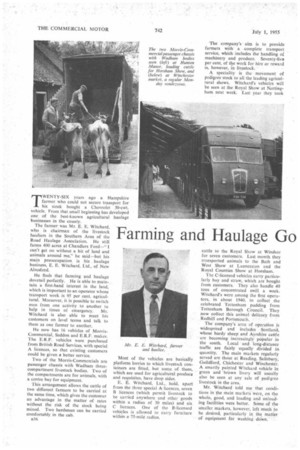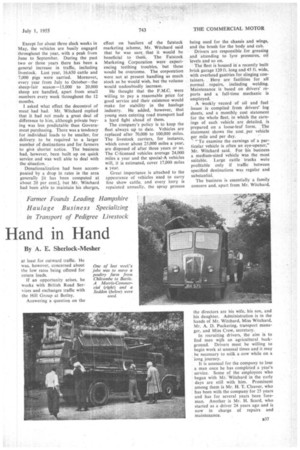Farming and Haulage Go Hand in Hand
Page 86

Page 87

If you've noticed an error in this article please click here to report it so we can fix it.
TWENTY-SIX years ago a Hampshire farmer who could not secure transport for his stock bought a Chevrolet 30-cwt. vehicle. From that small beginning has developed one of the best-known agricultural haulage businesses in the county.
The farmer was Mr. E. E. Witchard, who is chairman of the livestock hauliers in the Southern Area of the Road Haulage Association. He still farms 400 acres at Chandlers Ford—" I. can't get on without a bit of land and animals around me," he said—but his main preoccupation is his haulage business, E. E. Witchard, Ltd„ of New Al resford.
He finds that farming and haulage dovetail perfectly. He is able to maintain a first-hand interest in the land, which is important to an operator whose transport work is 95 per cent. agricultural. Moreover, it is possible to switch men from one activity to another to help in times of emergency. Mr. Witchard is also able to meet his customers on level terms and talk to them as one farmer to another.
He now has 16 vehicles of MorrisCommercial, Seddon and E.R.F. makes. The E.R.F. vehicles were purchased from British Road Services, with special A licences, so that existing customers could be given a better service.
Two of the Morris-Commercials are passenger chassis with Wad ham threecompartment livestock bodies. Two of the compartments arc for animals, with a centre bay for equipment.
This arrangement allows the cattle of two different farmers to be carried at the same time, which gives the customer an advantage in the matter of rates without the risk of the stock being mixed. Two herdsmen can be carried comfortably in the cab.
n36 Most of the vehicles are basically platform lorries to which livestock containers are fitted, but some of them, which are used for agricultural produce and requisites, have drop sides.
E. E. Witchard, Ltd., hold, apart from the three special A licences, seven B licences (which permit livestock tO be carried anywhere and other goods within a radius of 30 miles) and six C licences. One of the B-licensed vehicles is allowed to carry furniture within a 75-mile radius. cattle to the Royal Show at Windsor for seven customers. Last month they transported animals to the Bath and West Show at Launceston and the Royal Counties Show at Horsham.
The C-licensed vehicles carry particularly hay and straw, which are bought from customers. They also handle 40 tons of concentrated swill a week. Witchard's were among the first operators. in about 1940. to collect the celebrated Tottenham pudding from Tottenham Borough Council. They now collect this animal delicacy front Reclhill and Portsmouth.
The company's area of operation is widespread and includes Scotland, whose hardy sheep and Ayrshire cattle are becoming increasingly popular in the south. Local and long-distance traffic are fairly equally divided in quantity. The main markets regularly served are those at Reading, Salisbury, Guildford, Chichester and Winchester. A smartly painted Witchard vehicle in green and brown livery will usually also be seen at any sale of pedigree livestock in the area.
Mr. Witchard told me that conditions in the main market i were, on the whole, good, and loading and unloading facilities were better. Some of the smaller markets, however, left much to be desired, particularly in the matter of equipment for washing ddwn. at least for outward traffic. He was, however, concerned about the low rates being offered for return loads.
If an opportunity arises, he works with British Road Services and exchanges traffic with the Hill Group at Botley.
Answering a question on the the directors are his wife, his son, and his daughter. Administration is in the hands of Mr. Witchard, Miss Witchard, Mr. A. D. Puckering, transport manager, and Miss Crew, secretary.
In recruiting drivers, the aim is to find men with an agricultural background. Drivers must be willing to begin work at unusual times and it may be necessary to milk a cow while on a long journey.
It is unusual for the company to lose a man once he has completed a year's service. Some of the employees who began with Mr. Witchard in the early days are still with him. Prominent among them is Mr. H. T. Cleaver, who has been with the company for 25 years and has for several years been foreman. Another is Mr. H. Scard, who started as a driver 24 years ago and is now in charge of repairs and maintenance.












































































































































